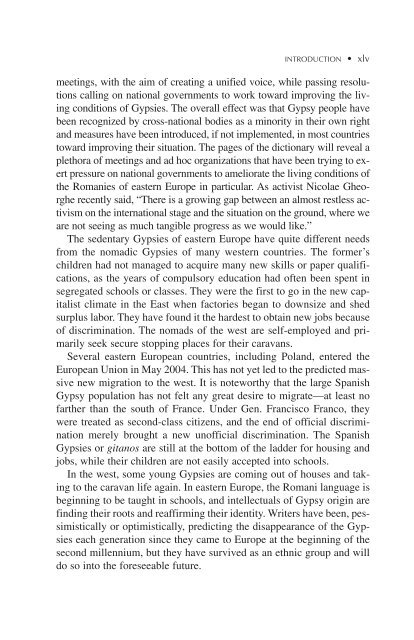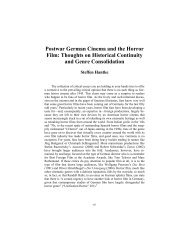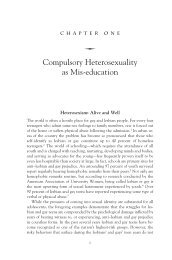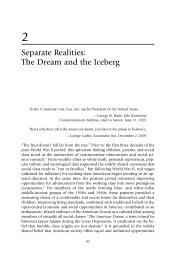Historical Dictionary of the Gypsies (Romanies) - Scarecrow Press
Historical Dictionary of the Gypsies (Romanies) - Scarecrow Press
Historical Dictionary of the Gypsies (Romanies) - Scarecrow Press
You also want an ePaper? Increase the reach of your titles
YUMPU automatically turns print PDFs into web optimized ePapers that Google loves.
INTRODUCTION • xlv<br />
meetings, with <strong>the</strong> aim <strong>of</strong> creating a unified voice, while passing resolutions<br />
calling on national governments to work toward improving <strong>the</strong> living<br />
conditions <strong>of</strong> <strong>Gypsies</strong>. The overall effect was that Gypsy people have<br />
been recognized by cross-national bodies as a minority in <strong>the</strong>ir own right<br />
and measures have been introduced, if not implemented, in most countries<br />
toward improving <strong>the</strong>ir situation. The pages <strong>of</strong> <strong>the</strong> dictionary will reveal a<br />
plethora <strong>of</strong> meetings and ad hoc organizations that have been trying to exert<br />
pressure on national governments to ameliorate <strong>the</strong> living conditions <strong>of</strong><br />
<strong>the</strong> <strong>Romanies</strong> <strong>of</strong> eastern Europe in particular. As activist Nicolae Gheorghe<br />
recently said, “There is a growing gap between an almost restless activism<br />
on <strong>the</strong> international stage and <strong>the</strong> situation on <strong>the</strong> ground, where we<br />
are not seeing as much tangible progress as we would like.”<br />
The sedentary <strong>Gypsies</strong> <strong>of</strong> eastern Europe have quite different needs<br />
from <strong>the</strong> nomadic <strong>Gypsies</strong> <strong>of</strong> many western countries. The former’s<br />
children had not managed to acquire many new skills or paper qualifications,<br />
as <strong>the</strong> years <strong>of</strong> compulsory education had <strong>of</strong>ten been spent in<br />
segregated schools or classes. They were <strong>the</strong> first to go in <strong>the</strong> new capitalist<br />
climate in <strong>the</strong> East when factories began to downsize and shed<br />
surplus labor. They have found it <strong>the</strong> hardest to obtain new jobs because<br />
<strong>of</strong> discrimination. The nomads <strong>of</strong> <strong>the</strong> west are self-employed and primarily<br />
seek secure stopping places for <strong>the</strong>ir caravans.<br />
Several eastern European countries, including Poland, entered <strong>the</strong><br />
European Union in May 2004. This has not yet led to <strong>the</strong> predicted massive<br />
new migration to <strong>the</strong> west. It is noteworthy that <strong>the</strong> large Spanish<br />
Gypsy population has not felt any great desire to migrate—at least no<br />
far<strong>the</strong>r than <strong>the</strong> south <strong>of</strong> France. Under Gen. Francisco Franco, <strong>the</strong>y<br />
were treated as second-class citizens, and <strong>the</strong> end <strong>of</strong> <strong>of</strong>ficial discrimination<br />
merely brought a new un<strong>of</strong>ficial discrimination. The Spanish<br />
<strong>Gypsies</strong> or gitanos are still at <strong>the</strong> bottom <strong>of</strong> <strong>the</strong> ladder for housing and<br />
jobs, while <strong>the</strong>ir children are not easily accepted into schools.<br />
In <strong>the</strong> west, some young <strong>Gypsies</strong> are coming out <strong>of</strong> houses and taking<br />
to <strong>the</strong> caravan life again. In eastern Europe, <strong>the</strong> Romani language is<br />
beginning to be taught in schools, and intellectuals <strong>of</strong> Gypsy origin are<br />
finding <strong>the</strong>ir roots and reaffirming <strong>the</strong>ir identity. Writers have been, pessimistically<br />
or optimistically, predicting <strong>the</strong> disappearance <strong>of</strong> <strong>the</strong> <strong>Gypsies</strong><br />
each generation since <strong>the</strong>y came to Europe at <strong>the</strong> beginning <strong>of</strong> <strong>the</strong><br />
second millennium, but <strong>the</strong>y have survived as an ethnic group and will<br />
do so into <strong>the</strong> foreseeable future.
















